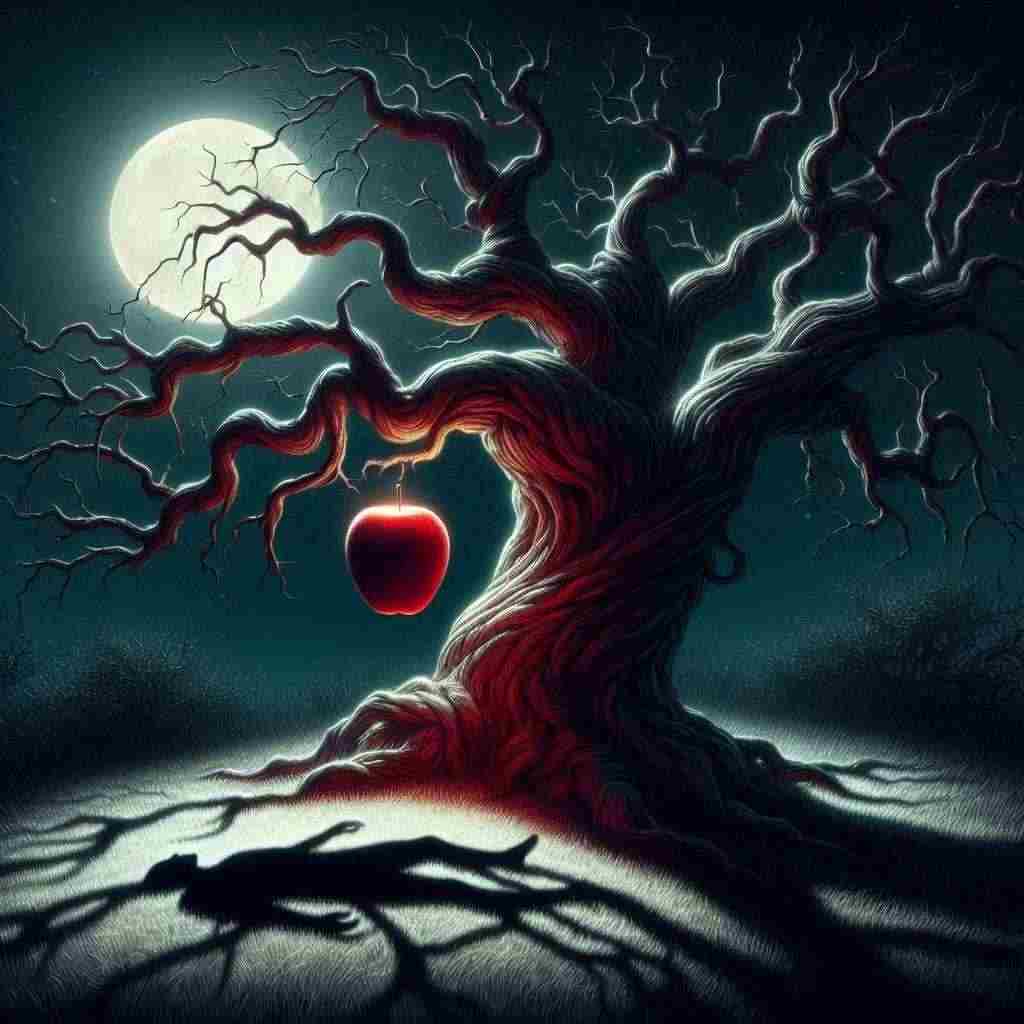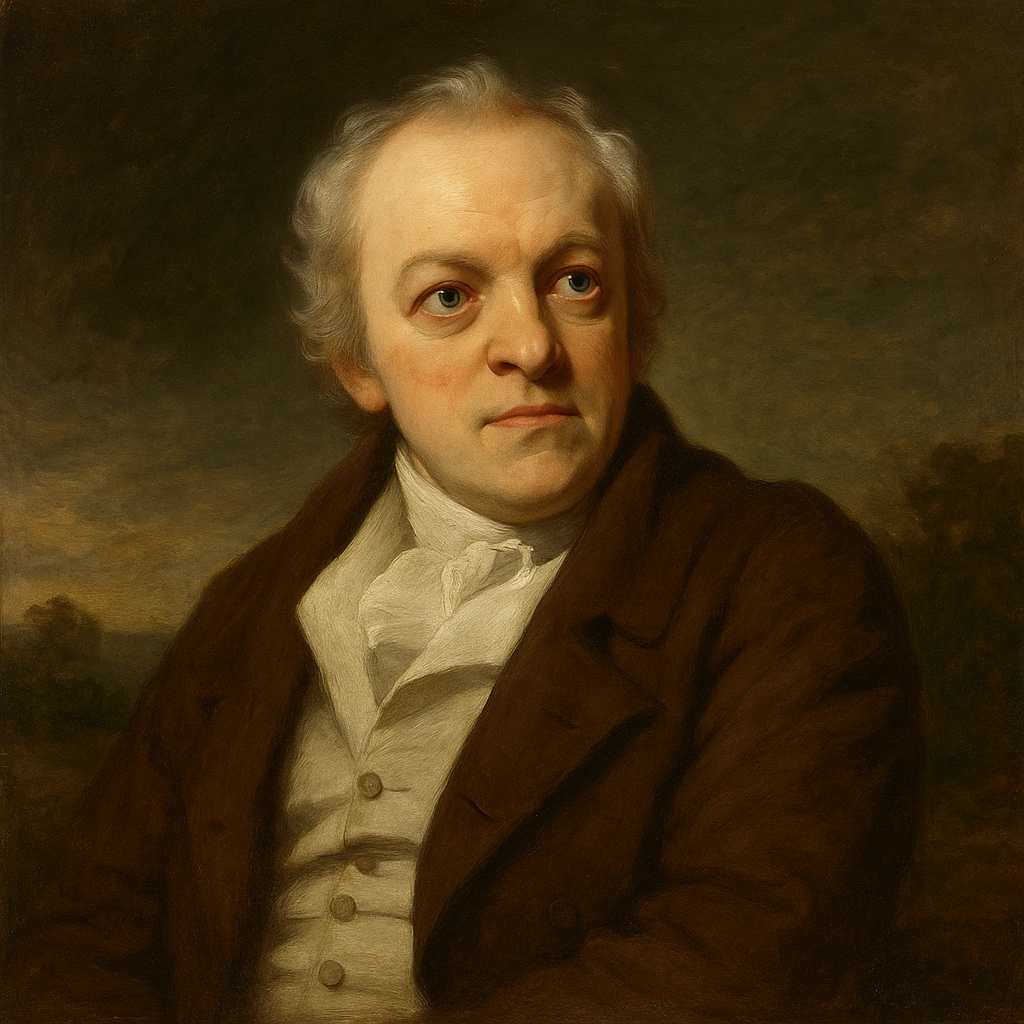A Poison Tree
William Blake
1757 to 1827

I was angry with my friend;
I told my wrath, my wrath did end.
I was angry with my foe:
I told it not, my wrath did grow.
And I waterd it in fears,
Night & morning with my tears:
And I sunned it with smiles,
And with soft deceitful wiles.
And it grew both day and night.
Till it bore an apple bright.
And my foe beheld it shine,
And he knew that it was mine.
And into my garden stole,
When the night had veild the pole;
In the morning glad I see;
My foe outstretched beneath the tree.
William Blake's A Poison Tree
William Blake's "A Poison Tree," first published in his 1794 collection Songs of Experience, stands as a profound exploration of the human psyche, particularly focusing on the destructive nature of suppressed anger and the consequences of nurturing one's resentments. This deceptively simple poem, composed of four quatrains with an AABB rhyme scheme, belies a complex web of symbolic imagery, biblical allusions, and psychological insight that continues to resonate with readers more than two centuries after its creation.
The Duality of Anger: Expression vs. Suppression
The poem opens with a stark contrast:
I was angry with my friend; I told my wrath, my wrath did end. I was angry with my foe: I told it not, my wrath did grow.
Here, Blake immediately establishes the central theme of the poem: the duality of anger and its expression. The first two lines present a healthy resolution of anger through open communication. The use of the past tense "was" and "did end" suggests a complete resolution of the conflict. In contrast, the second scenario introduces a lingering, festering anger that remains unresolved due to its suppression.
This opening stanza serves multiple purposes. First, it sets up the narrative framework for the rest of the poem. Second, it introduces the speaker as an everyman figure, someone with whom the reader can easily identify. Lastly, it presents a moral dilemma that will unfold throughout the poem: the choice between honest expression and deceitful suppression of emotions.
The Cultivation of Wrath: A Poisonous Garden
The second and third stanzas detail the careful cultivation of the speaker's wrath:
And I waterd it in fears, Night & morning with my tears: And I sunned it with smiles, And with soft deceitful wiles.
And it grew both day and night. Till it bore an apple bright. And my foe beheld it shine, And he knew that it was mine.
Blake employs an extended metaphor of gardening to illustrate the nurturing of anger. The speaker "waters" their wrath with tears and "suns" it with false smiles. This imagery is rich with implications. The tears suggest that the suppression of anger causes ongoing pain to the one harboring it. The "soft deceitful wiles" imply a facade of pleasantness that masks the growing resentment beneath.
The use of "Night & morning" and "both day and night" emphasizes the constant, unrelenting nature of this emotional cultivation. It consumes the speaker's life, growing inexorably until it manifests as a tantalizing "apple bright."
Biblical Allusions and Symbolic Resonance
The image of the apple is particularly loaded with symbolic meaning. It immediately evokes the biblical narrative of the Garden of Eden, where the fruit of the Tree of Knowledge led to humanity's fall from grace. In Blake's poem, the apple represents the culmination of the speaker's nurtured anger – a poisonous fruit born of deceit and resentment.
The line "And my foe beheld it shine" introduces an element of temptation. Just as Eve was tempted by the serpent, the foe is drawn to the alluring but deadly fruit. The phrase "And he knew that it was mine" suggests a recognition of the speaker's ownership of this anger, perhaps implying that the foe understands the source of the resentment but is powerless against its allure.
The Fatal Conclusion: Triumph or Tragedy?
The final stanza brings the poem to its dark conclusion:
And into my garden stole, When the night had veild the pole; In the morning glad I see; My foe outstretched beneath the tree.
The imagery here is rife with tension and ambiguity. The foe's act of stealing into the garden "When the night had veild the pole" suggests a clandestine, perhaps shameful act. The darkness could symbolize moral blindness or the obscuring nature of desire.
The final two lines present a startling juxtaposition. The speaker's gladness at seeing their foe "outstretched beneath the tree" is deeply unsettling. Is this a triumph of vengeance or a tragedy of mutual destruction? The ambiguity is likely intentional, forcing the reader to grapple with the moral implications of the scene.
Psychological Depth and Universal Themes
While "A Poison Tree" can be read as a straightforward cautionary tale about the dangers of suppressed anger, its psychological insights run much deeper. Blake explores the human tendency towards self-destruction when we nurture our negative emotions. The speaker's careful cultivation of their wrath ultimately leads to a form of poisoning – not just of the foe, but of the speaker's own psyche.
The poem also delves into themes of duplicity and the human capacity for deception. The "soft deceitful wiles" that the speaker employs speak to the masks we wear in society, hiding our true feelings behind a veneer of civility. This exploration of the gap between our internal emotional landscapes and our external presentations resonates strongly with modern psychological understanding of emotional repression and its consequences.
Stylistic Mastery and Poetic Technique
Blake's mastery of poetic technique is evident throughout "A Poison Tree." The simple AABB rhyme scheme and regular meter (primarily iambic tetrameter) give the poem a song-like quality, reminiscent of nursery rhymes or folk ballads. This apparent simplicity contrasts sharply with the dark, complex themes explored within.
The use of personification throughout the poem – the wrath that grows, the garden that bears fruit – brings an visceral, animate quality to abstract emotions. This technique allows Blake to explore internal psychological states through external, tangible imagery.
Blake's economy of language is also noteworthy. In just sixteen lines, he constructs a complete narrative arc, from the initial anger to its fatal conclusion. Every word is carefully chosen for maximum impact, with no superfluous language to detract from the poem's building tension.
Contemporary Relevance and Universal Appeal
Despite being written over two centuries ago, "A Poison Tree" remains strikingly relevant to contemporary readers. In an age where social media and digital communication often obscure genuine human interaction, the temptation to nurture private resentments rather than address conflicts openly is perhaps stronger than ever.
The poem's exploration of the self-destructive nature of suppressed anger resonates with modern psychological understanding of emotional health and the importance of processing and expressing our feelings in healthy ways. It serves as a poignant reminder of the potential consequences of allowing negative emotions to fester unchecked.
Conclusion: The Enduring Power of Blake's Vision
"A Poison Tree" stands as a testament to William Blake's poetic genius and psychological insight. Through its vivid imagery, biblical allusions, and exploration of universal human emotions, the poem continues to captivate readers and invite multiple interpretations.
At its core, "A Poison Tree" is a stark warning about the dangers of emotional repression and the cultivating of resentments. It challenges us to confront our anger openly and honestly, lest it grow into something poisonous and uncontrollable. In doing so, Blake not only crafted a masterpiece of Romantic poetry but also provided a timeless exploration of the human heart's darker tendencies.
As we continue to grapple with issues of conflict, communication, and emotional honesty in our personal and societal interactions, "A Poison Tree" remains a powerful reminder of the consequences of nurturing our wrath and the liberating potential of open, honest expression of our emotions.
This text was generated by AI and is for reference only. Learn more
Want to join the discussion? Reopen or create a unique username to comment. No personal details required!



Comments
No comments yet. Be the first to comment!